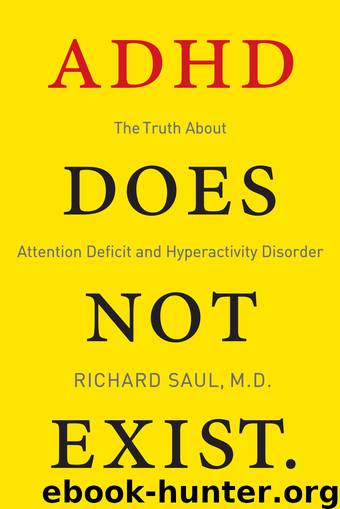ADHD Does not Exist by Richard Saul

Author:Richard Saul
Language: eng
Format: epub
Publisher: HarperCollins
Published: 2013-12-23T16:00:00+00:00
PERPETUAL-MOTION MAX
When I first saw eight-year-old Max at my office, he was like a perpetual-motion machine. He tapped his fingers on the waiting room table and swung his legs back and forth, shaking his feet violently. Max’s parents reported that the fidgeting was becoming a problem in school. “His teacher says he’s academically on track,” his mother said, “but he just can’t stop moving around. He’s distracting himself and everyone else.” His parents also noted his “incredibly short attention span.” At home, he would struggle to sit at the table to do his homework or eat dinner with the family, impulsively rising to engage in other activities (for example, watching TV). At school, he had trouble concentrating on in-class work and the teacher’s presentations. When I asked Max about his fidgeting and impulsive behavior, he said he “didn’t know” he was doing it so much. He also reported that his neck was sometimes stiff or sore.
Six months earlier, based on Max’s fidgeting and distractibility, his pediatrician had diagnosed him with ADHD and started him on a stimulant. Max’s symptoms didn’t improve much and, within two months of starting on the medication, the boy had developed mild tics, including blinking his eyes, rolling his head, and grunting. His mother said, “At first we thought it was just part of his fidgeting. And sometimes he went weeks without doing it.” But Max’s parents began to believe the stimulant may have caused the tics, and mentioned this concern to the pediatrician. The doctor suggested Max try a different stimulant, but the family decided to hold off on any medications before seeking a second opinion. On his first visit to my office, Max showed no signs of the tics his family reported.
We decided to observe Max’s symptoms over the next months, rather than making a diagnosis or starting the boy on a new medication. Soon his fidgeting and tics worsened, affecting Max’s behavior at home and school. The tics had become especially more pronounced, with more intense and prolonged blinking and head rolls, and louder, more frequent grunting. Beyond affecting Max’s performance, the symptoms had social repercussions for the boy. His father said, “Some of the kids are teasing him about it and imitating him.” Tearfully, Max agreed, and the family reported that the social stress seemed to have made the boy’s tics even worse, along with his problems with distractibility and impulsiveness.
It was clear the family needed relief from Max’s symptoms as quickly as possible.
Download
This site does not store any files on its server. We only index and link to content provided by other sites. Please contact the content providers to delete copyright contents if any and email us, we'll remove relevant links or contents immediately.
Periodization Training for Sports by Tudor Bompa(8272)
Why We Sleep: Unlocking the Power of Sleep and Dreams by Matthew Walker(6725)
Paper Towns by Green John(5191)
The Immortal Life of Henrietta Lacks by Rebecca Skloot(4588)
The Sports Rules Book by Human Kinetics(4386)
Dynamic Alignment Through Imagery by Eric Franklin(4217)
ACSM's Complete Guide to Fitness & Health by ACSM(4060)
Kaplan MCAT Organic Chemistry Review: Created for MCAT 2015 (Kaplan Test Prep) by Kaplan(4012)
Livewired by David Eagleman(3772)
Introduction to Kinesiology by Shirl J. Hoffman(3769)
The Death of the Heart by Elizabeth Bowen(3621)
The River of Consciousness by Oliver Sacks(3604)
Alchemy and Alchemists by C. J. S. Thompson(3520)
Bad Pharma by Ben Goldacre(3427)
Descartes' Error by Antonio Damasio(3279)
The Emperor of All Maladies: A Biography of Cancer by Siddhartha Mukherjee(3163)
The Gene: An Intimate History by Siddhartha Mukherjee(3098)
The Fate of Rome: Climate, Disease, and the End of an Empire (The Princeton History of the Ancient World) by Kyle Harper(3067)
Kaplan MCAT Behavioral Sciences Review: Created for MCAT 2015 (Kaplan Test Prep) by Kaplan(2986)
